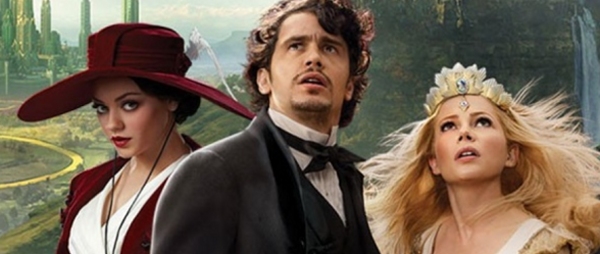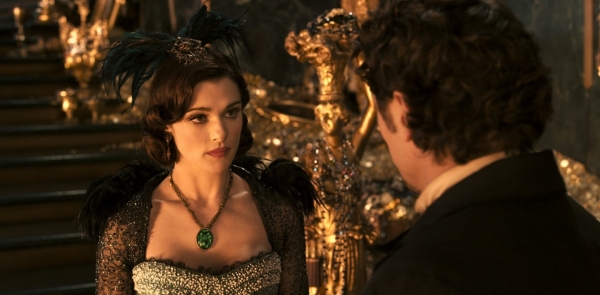Oz the Great and Powerful – What Just Happened?

So, I saw Oz the Great and Powerful, a movie I had been anxiously anticipating for months. I had been on Twitter, on You Tube, following sneak peeks and previews. I’d found a clip featuring costume and set designers and got so excited that I almost cried. At long last, the movie had been released and I raced to the theater. However as I exited the theater I was a little upset, as I had witnessed a degradation and simplification of a classic villain. Yes, the film contained spectacular effects and it is worth seeing it again to fully appreciate the costumes, the sets, animation and puppetry. But I could not get past this business with the green witch. If you would like to avoid spoilers, please stop reading now.
I thought the colour choice foreshadowed strength, growth, and good things for Theodora’s character. I was wrong.
THE SET UP:
The protagonist, Oscar Diggs, is a small-time Midwestern traveling circus magician who routinely seduces women. We see him present his admiring assistant with a gift, a music box which he claims once belonged to his deceased grandmother. We learn that this is a ploy to impress unsuspecting women; that Oscar possesses many music boxes which once belonged to his deceased grandmother.
While running away from the muscular protector of a lady whom he has recently seduced and discarded, he hops into a flying balloon, releases the cords, is swept away by a tornado, and lands in Oz.
Theodora, an attractive witch who lives in Oz and will later transform into the Wicked Witch of the West, witnesses Oscar’s crash landing and approaches him. She explains that his arrival is the fulfillment of a prophecy stating that a wizard will arrive in Oz and save the land from the evil witch who had killed the previous king, which happened to have been her father. Theodora also mentions that her sister, Evanora, is skeptical of the prophecy. Therefore, Theodora is anxious for Evanora to meet him. The wizard, of course, will inherit the throne as well.
Thodora is visibly taken with Oscar and moons at him throughout their encounter. As she removes her wide brimmed hat, hair falls over one eye and she glances up at him. He whips out a music box; a conversation follows in which Theodora reveals that no one has ever given her a gift before, and he surmises that she has never been asked for a dance. So he holds her closely and teaches her to dance, they kiss, and the camera pans up to the night sky.
 While the audience is to believe that Theodora will be a naïve victim of Oscar’s charms, the witch’s attire is notable and suggests otherwise: she is dressed in tight black riding pants, heels, a blood red riding coat, and matching red, wide-brimmed hat. Red, of course, symbolizes sexuality, power, passion, and war. I thought the colour choice foreshadowed strength, growth, and good things for Theodora’s character. I was wrong.
While the audience is to believe that Theodora will be a naïve victim of Oscar’s charms, the witch’s attire is notable and suggests otherwise: she is dressed in tight black riding pants, heels, a blood red riding coat, and matching red, wide-brimmed hat. Red, of course, symbolizes sexuality, power, passion, and war. I thought the colour choice foreshadowed strength, growth, and good things for Theodora’s character. I was wrong.
Night came and passed. Interesting. The following day, Theodora announces that she and Oscar were meant to be together, proclaims that she will be his queen, and comically skips on down the road towards home, the Emerald City. Oscar is uncomfortable with any hints of commitment, but riches trump commitment so he goes along. However at this point, I am wondering which of the characters is really the true manipulator.
Enter Sidekick Number One
Now that we have learned a little about two of the main characters, the movie is free to introduce the sidekicks – one of which is Finley, fast-talking monkey dressed in a bellhop’s suit who verbalizes the audience’s suspicions about Theodora’s vulnerability and Oscar’s facade: “What about that poor girl… You’ve got to tell her…” and so forth.
Meet…The Sister
 .
.
Evanora, Theodora’s sister.
When the trio arrives at the Emerald City, we finally get to meet the sister, Evanora. She is obviously a bit older and much more sophisticated than Theodora. Her speech is measured and and her mannerisms are dramatic; she is dressed in an emerald green, floor-length, long-sleeved evening gown; it’s style is reminiscent of the 1930’s-era formals. The shoulders are feathered, and she wears a matching green feathered head-piece. Evanora possesses a classic, refined beauty and she flirts openly with Oscar. Of course, he reciprocates.
But once Oscar is out of sight, the sisters briefly quarrel over the probability of Oscar’s being the prophesied wizard, and it is at this point that Evanora’s manipulative nature is confirmed as she provokes Theodora by accusing her of disloyalty and evilness, and we glimpse Theodora’s temper as she uncontrollably hurls a fireball in response.
And although she had previously expressed doubts, Evanora provides Oscar with a tour of both the palace and its riches, and casually mentions that fulfillment of the prophecy includes killing the Wicked Witch.
Lured by the promise of fortune, Oscar accepts the challenge. Citing an inability to say goodbye to Theodora he prefers to leave in the morning, as opposed to heading out during the night, but Evanora persuades him to leave immediately.
A cunning older sister and a needy younger sister, groundwork for familiar sibling rivalry. But probably because the sisters were not the central characters, this tension was not thoroughly explored. I wished it had been, because this film is not only about the wizard’s beginnings, it attempts to explain The Wicked Witch of the West’s beginnings as well.
Enter Sidekick Number Two
While on the road, Oscar and Finley encounter a porcelain doll named China Girl, who I must say is the most developed and interesting character in the film.
China Girl is an orphan whose village had been destroyed by the wicked witch. When we meet her, she is crying, crippled, and hiding behind rubble; her legs had been broken during the village attack. Oscar is sympathetic and repairs her legs using superglue, which he happens to have had in his travel bag.
China Girl’s composition (china) state in which we first meet her (shattered legs) and size (slight) speak to her vulnerability. However, as soon as her legs are repaired, her spunk becomes apparent: she kicks Oscar when he displays condensation towards her, miraculously turns on the tears when he refused to allow her to accompany him on his quest, and even carries a pocket knife for protection.
This character, unlike Theodora (and Glinda, whom we’ll meet later) is proactive. In fact, it is China Girl who risks her life, twice, to defeat the witches. Once when saving a magic wand from evil hands, and again when returning it to its rightful, handcuffed and imprisoned owner. Why does a CGI character have the most guts and common sense?
Eventually, the group stumbles upon Glinda who explains that Evanora is the true murderous witch. After a wicked army pursues them, Oscar realizes that Glinda is probably correct.
So, now we have the set up, the premise, the problem, and the relevant sidekicks.
But for me the movie really went downhill from here:
Back at the ranch, Theodora, dressed in more trademark red, is alarmed that Oscar has gone missing and runs to Evanora. “Sister, the wizard is gone!”
Evanora takes this opportunity to play on Theodora’s insecurities: she conjures up a music box, claims that Oscar gave it to her, and raves about how she and Oscar had danced together and how even now she could still feel his body–saying that indeed, Oscar had “come to my chambers” the previous night. She then uses a crystal ball to display Oscar and Glenda strolling merrily along the road together, smiling and having a good time.
Theodora begins to cry and turns to her sister. “He said we would rule Oz together. He said I would be his queen.”
Evanora twists the knife a little bit more and questions whether he really said this, or if, on the other hand Theodora had said it herself. Which of course, she did.
A heartbroken Theodora begins to have a kind of breakdown and flings herself in front of a mirror “You fool!” she cries to her own reflection, as burning—yes, literally burning—tears stream down her face. “Serves you right!” she screams, and as the breakdown intensifies, she shrieks and smashes the glass.
I guess we were to feel sorry for her, but honestly, I couldn’t determine whether she was heartbroken over the supposed romantic betrayal or over the possibility of her not becoming queen. I was really hoping she was upset over the latter, because there was no evidence of a real relationship here and I was nervous that the clingy-girl-gets dumped-cliché was beginning to creep into the story.
We have a girl who may have had a ten hour flirtation of some kind with a man. A girl whose sister—who provokes and antagonizes—claimed to have had a fling with the same man, a man who was now seen walking next to another woman and smiling. That is all. Ambition I can understand. But the needy theme is something else again.
My hopes were raised when Theodora briefly got herself together and mentioned the throne once more. Upon staring into the crystal ball again and witnessing Oscar victoriously host a smiling Glinda’s hand into the air, Theodora says, “Look at them, look at how happy they look. Do you think she will be his queen?”
“Well of course she’ll be his queen.” Evanora replies. “What did you expect? Can’t compete with Glenda’s charms. No one can.”
Fresh tears fall. She she begins to bawl again. “Sister it hurts!”
“Such is a broken heart. Evanora replies. Your precious wizard did this to you.”
“Make it stop!” Theodora pleads.
Evanora then offers Theodora an apple, promising that one little taste will make her heart impenetrable. To be fair Evanora does dangle the queen idea again, mentioning the probability of herself and Theodora sharing the throne together, and adds: “…unless you’d rather see Oz and Glinda there.” But by ‘there,” did she mean as queen or as wife?
Theodora takes a hulking bite. Shrieking, cackling, and flailing about ensue as she transforms into the green witch that we who love villains adore. Evanora is visibly taken by Theodora’s disfigurement and offers to restore her beauty. But Theodora refuses with, oh my goodness, she refuses with:
Theodora
This is who I am now! I want him to see me like this!
I want him to know that he is the one who made me this way!
This is where the film lost me, and I haven’t yet quite recovered. Oz the Great and Powerful is telling us that the green witch became the green witch because she’s a scorned woman. Because she got dumped by her boyfriend. Or rather because she thinks she got dumped someone whom she thinks was her boyfriend. Not only does she believe Oscar responsible for her change, it is important to her that Oscar see her, that he is aware of what he supposedly has done:
Theodora
I want him to see me like this!!!
Why? Is he supposed to feel guilty? Why waste the time?
Theodora
I want him to know that he is the one who made me this way!!
Does she really believe he “made her this way?” And what is his knowing it supposed to accomplish? Why hold on like this? If he didn’t feel sorry for her then, why would he feel sorry for her now? This is insulting, clingy-female soap opera material and absolutely, most certainly, does not form a sufficient basis for villainy.
Seriously.
Usually, villains have a universal character trait which is, somehow, severely unbalanced – a flaw. But when presenting a picture of the villain before their turn to malevolence, a clear understanding of the flaw’s development and evolution is crucial. And while we don’t agree with the villain’s actions (usually) we understand their motivation; in fact, we see that the scariest villain really believes he (or she) is doing the right thing. And whats even more disturbing is that we understand why; this is what shakes us up. We see that the villain is not out of control. Warped maybe, but not out of control.
Oscar’s callous treatment warranted hurt feelings for sure , but it was not enough to send her over the edge, and the introduction of the magic apple to finish the job made the transformation feel rushed.
If the episode with Oscar served as the catalyst for Theodora’s meltdown, something, or some things, would have to have to have happened to Theodora to get her to such a fragile point. But we didn’t see it.
And there was potential. Theodora’s flaw was jealously, or perhaps insecurity. That’s great. But there was no explanation for her emotional fragility and gullibility, no build-up or chain of events which led to the meltdown. So as presented, we see an intense overreaction which makes her seem, quite frankly, delusional. Which unfortunately is a common stereotype of women who find themselves on the bad end of a relationship. I really don’t think this is an acceptable origin for a character who is commonly referred to as one of the top ten villains of all time! And the only female to rate so high.
I didn’t think it could get much worse, but during Theodora’s first post transformation face to face with Oscar, it did.
After heart to heart talks with Glinda and China Girl, who believe in his abilities, if not his wizardry, Oscar decides to use his knowledge of technology to convince the people of Oz that he really is the wizard. In a scene where he addresses the townspeople, Theodora appears to appear to threaten, demoralize and “be seen” During her “threat-speech” Theodora stares at him as if still in love and remembering “the good old days “..You all believe in him!” She mocks. “Well, so did I once….”
Additionally, when confronting Oscar specifically, she reiterates her belief in his culpability.
Oscar
(to Glinda):
Who’s that?
Theodora
(turning towards Oscar)
Don’t you recognize me wizard? Have I changed so much?
…a few minutes later:
Oscar
Theodora, what happened to you?
Theodora
You happened to me!
It was heart-breaking.
A classic villain gives away her power, her self-responsibility, and places it into the hands of someone whom she met about two days ago.
I didn’t go in expecting Oz the Great and Powerful to live up to The Wizard of Oz, nor to compare. And no, I have not seen Wicked so there was no comparison there, either. I simply wanted a little bit of escapism, to see wondrous sets, grand costumes, to get utterly lost in fantasy land.
The costumes, sets, and animation were impressive, make no mistake about it, yet I could not get past this business with the Wicked Witch. In terms of the story, Theodora chased love and ambition. And in retrospect, I think back to her color choices and my initial hopes for what they represented. And now I wonder: for what exactly is Theodora being punished?
In terms of the actual events, Theodora blames her transformation, inside and out, on being re-buffed by a playboy; worse yet, the transformation is based upon a fantasy, upon a relationship that existed only in Theodora’s mind. She is holding someone else responsible not only for her happiness, but for her decision to wallow in her misery. And, she wants Oscar to see her, to witness what she believes he did to her, as if looking despite everything, for validation or sympathy. What a tearing down of a classic female villain. She deserved better. As my pal Maleficent would say, “A disgrace to the forces of evil.”
(Repost from my old site)